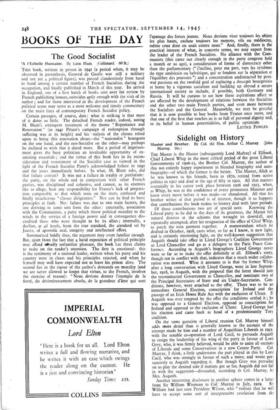BOOKS OF THE DAY
The Good Socialist•
'A l'Echelle Humatne. By Leon Blum. ;Gallimard. 60 fr.)
THIS book, written in prison in 1941 (a period when, it may be observed in parenthesis, General de Gaulle was still a military and not yet a political figure), was passed clandestinely from hand to hand among a certain number of French Socialists during the occupation, and finally published in March of this year. Its arrival in England, one of a first batch of books sent over for review by French publishing houses, coincides aptly enough with the visit of its author ; and for those interested in the development of the French political scene may serve as a most welcome and timely commentary on the main lines of contemporary French Socialist policy.
Certain passages, of course, date: what is striking is that most of it dates so little. The detached French reader, indeed, noting M. Blum's astringent treatment of the theme "Repentance and Renovation" (in 1941 Petain's campaign of redemption through suffering was at its height) and his -nalysis of the classes relied upon to bring this renovation about—the " nationalist " bourgeois on the one hand, and the neo-Socialist on the other—may perhaps be inclined to wish that it dated more. But a period of imprison- ment gives the busy politician an invaluable opportunity of ex- amining essentials ; and the virtue of this book lies in its recon- sideration and restatement of the Socialist case as viewed in the light of the French Socialist Party's acknowledged failure in 1940 and the years immediately before. In what, M. Blum asks, did that failure consist? It was not a failure in loyalty or patriotism: the party, on the whole and in comparison with other French parties, was disciplined and cohesive, and cannot, as its enemies like to allege, bear any responsibility for France's lack of prepara- tion comparable to that which rests on the inert, confused and finally treacherous "classes dirigeantes." Nor can he find its basic principles at fault. No: failure was due to two main factors, the one deriving in some sort from the other: externally, association with the Communists, a party which threw political morality to the winds in the service of a foreign power and in consequence dis, credited thost who were thought to be its allies ; internally, a decline, at all levels, from the true standard, the standard set by Jaures, of apostolic zeal, integrity and intellectual effort.
Summarised baldly thus, the argument may scem familiar enough. But, apart from the fact that a lucid exposition of political principle may afford sit adly unfamiliar pleasure, the book Las three claims to make on the reader's -attention. The first is emotional: this is the testimony of a national leader, written when his party and his country were in chaos and his principles rejected, and when he himself may well have expected not to leave his prison alive: The second lies in the rigour of the author's demands on morality (and we are never allowed to forget that virtue, to the French, involves the exercise of reason): "Nous devions dormer l'exemple de la fierte, du desinteressement absolu, de la grandeur d'ame qui sont rapanage des forces jewaes. Nous devions viser toujours lea objets les plus hauts, exclure toujours lea moyens, vils ou mediocres, meme ceux dont on usait contre nous." And, finally, there is the practical interest of what, in concrete terms, we may expect from the leader of the French Socialists. No alliance with the Com- munists (this came out clearly enough in the party congress held a month or so ago), a consideration of forms of democracy other than the parliamentary (" rincline, pour ma part, vers lea systemes du type americain ou helvetique, qui se fondent sur la separation et requilibre des pouvoirs ") and a concentration undistracted by post- war passions on the twofold goal of replacing a deciepit bourgeoisie at home by a vigorous socialism and building up abroad a secure international society to include, if possible, both Germany and Russia. It will be curious to see how these aspirations affect or are affected by the development of relations between the Socialists and the other two main French parties, and even more between the Socialists and the General Meanwhile, we may be grateful that it is now possible to buy books from France once more, and that one of the first that reaches us is so full of personal dignity and, in its belief in human potentialities, of public optimism.
LETTICE FOWLER.


























 Previous page
Previous page